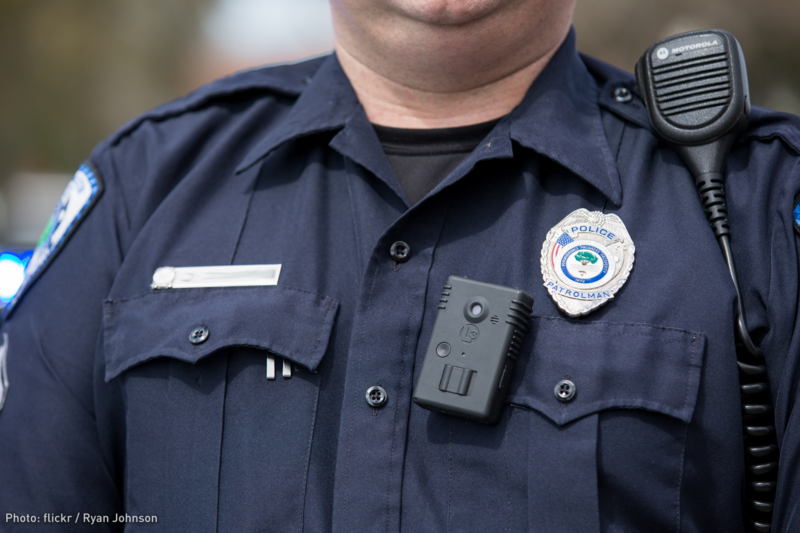We’re Updating Our Police Body Camera Recommendations for Even Better Accountability and Civil Liberties Protections


We’ve always acknowledged that the issue of police body cameras is a tough one, and that while we have advocated for policies that aimed simultaneously to protect privacy and promote police oversight, we knew that our recommendations would evolve as this complex technology works its way into the messy real world. We already made some pretty fundamental changes to our recommended policies once before.
Now we’ve issued a version 2.0 of our more detailed model legislation, incorporating a number of tweaks that we have been persuaded will improve the way implementing agencies deploy body cameras.
One of the more significant changes involves what kind of video is subject to public release and what kind is not. Our view is that for privacy reasons, the majority of body-camera video should not be subject to public release. The exception is where there is a strong public interest in that video that outweighs privacy concerns: where there is a use of force, or a complaint against an officer. In the prior version, we also recommended that any video of a felony arrest be in that category, but we’ve decided that’s too broad, because it would encompass a wide variety of DUI and other routine arrests that, in the absence of a use of force or complaint against an officer, are not of vital public importance.
We have also added language stipulating that police departments cannot use “investigative privilege” as a basis for withholding footage where the suspect is a police officer (who likely is the one who recorded the video and has been allowed to see it). As we argue at greater length here, the rationale for such a privilege (tipping off suspects) does not apply when the suspect is a police officer. We do allow that redaction, subject to limitations, can be used in such situations.
Other changes in our recommended body camera legislation:
- Videos that capture a police use of force (which is now defined with specificity) or that are the subject of a police complaint must be released to the public, irrespective of any contrary provisions in state open records laws.
- Videos in which a subject is killed, shot by a firearm, or grievously injured need to be released within five days of a public request because of the urgent public interest in access to such footage.
- Requests for footage must provide some degree of specificity as to the video being sought, so disruptive requests for “all body camera videos” can be rejected.
- Explicit rules for the use of redaction technology to protect privacy are now included.
- The rules for body camera video also apply to any audio collected by such devices: Sometimes a camera will fall off an officer or otherwise fail to capture useful images, for example, but the authorities must still release whatever audio might have been captured.
- The question of who has the right to inspect (without receiving a copy) a body camera video is clarified.
- The new policy includes language ensuring that videos cannot be voluntarily released by police without first securing the video subject’s approval (so the police and public have same rights).
- The new policy clarifies that the prohibition against officers viewing video footage in advance of filling out reports applies only to videos depicting a use of force.
- The new policy clarifies rules and warrant requirements for using facial recognition technology or other video analytics on policy body camera videos.
We have already seen some state governments and police departments substantially embrace our recommendations, such as the and the Parker Police Department in Colorado, and we hope that these best practices will become widespread in order to ensure that body cameras are not reduced to yet another surveillance tool, but actually serve their intended function as a check and balance on police power.


